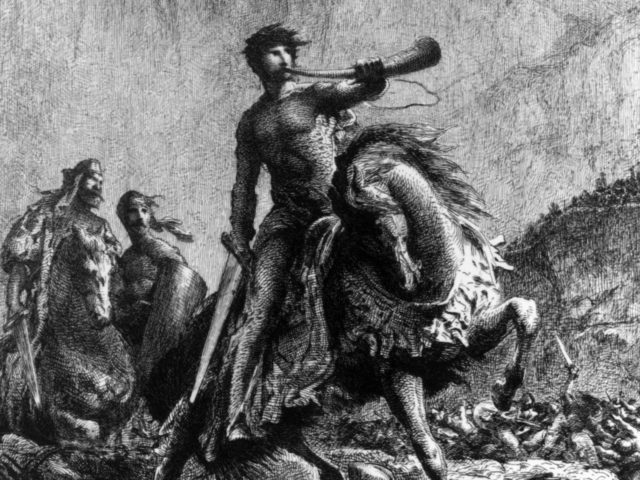ROME — Pope Francis trotted out a scene from the 11th-century French epic poem La Chanson de Roland this week to prove Christians have tried to convert Muslims by the sword, just as Muslims have done to Christians.
“A scene from The Song of Roland comes to me as a symbol, when the Christians defeat the Muslims and line them up in front of the baptismal font, with one holding a sword,” the pope told an Argentinian interreligious dialogue group Monday.
“And the Muslims had to choose between baptism or the sword. That is what we Christians did,” he declared.
It did not take long for the French themselves to cry foul, reproaching the pontiff both for besmirching one of their most beloved pieces of epic literature and for using a fictional narrative to illustrate a point about how Christians supposedly behave.
“La Chanson de Roland is obviously not a historical chronicle of events, but an epic poem, a chanson de geste, the oldest and most complete manuscript, written in Anglo-Norman, and dates back to the early twelfth century, four centuries after the facts it is supposed to recount,” wrote Vini Ganimara Thursday for the French Catholic news site Riposte Catholique.
The Song of Roland was indeed inspired in part by a historical event, namely Charlemagne’s expedition to Spain in 778, Ganimara observes, but this expedition to Spain was actually undertaken at the request of several Muslim governors of Spain, in rebellion against the Emir of Cordova.
Moreover, the invasion was unsuccessful, and is recounted as such in the poem.
“The memory of Pope Francis evoking the victory of the Franks over Muslims is therefore confused, because the expedition was not a victory,” Ganimara observes.
“The fictitious case of the forced baptism of Muslims supposedly defeated after the capture of Zaragoza — which did not take place — is not historical, but is a pure imagination of the poet,” he adds, noting that contrary to the pope’s account, there is not even a Christian holding a sword in the original work.
“How then can he affirm that ‘this is what we Christians did’?” he concludes.
In his address, Pope Francis was attempting to show that it is not just Islamic extremists who practice violent fanaticism, but that Christians are equally guilty of religiously motivated violence.
“Beware of the fundamentalist groups: everyone has his own,” Francis said. In Argentina too there is a little fundamentalist corner,” the pope told his hearers.
“Fundamentalism is a scourge and all religions have some kind of fundamentalist first cousin there, which forms a group,” he said.
In asserting that all religions are equally prone to violence, the pope was reiterating a personal conviction that he has shared on several other occasions.
“If I speak of Islamic violence, I must speak of Catholic violence,” Francis said in 2016. “And no, not all Muslims are violent, not all Catholics are violent. It is like a fruit salad; there’s everything.”

COMMENTS
Please let us know if you're having issues with commenting.